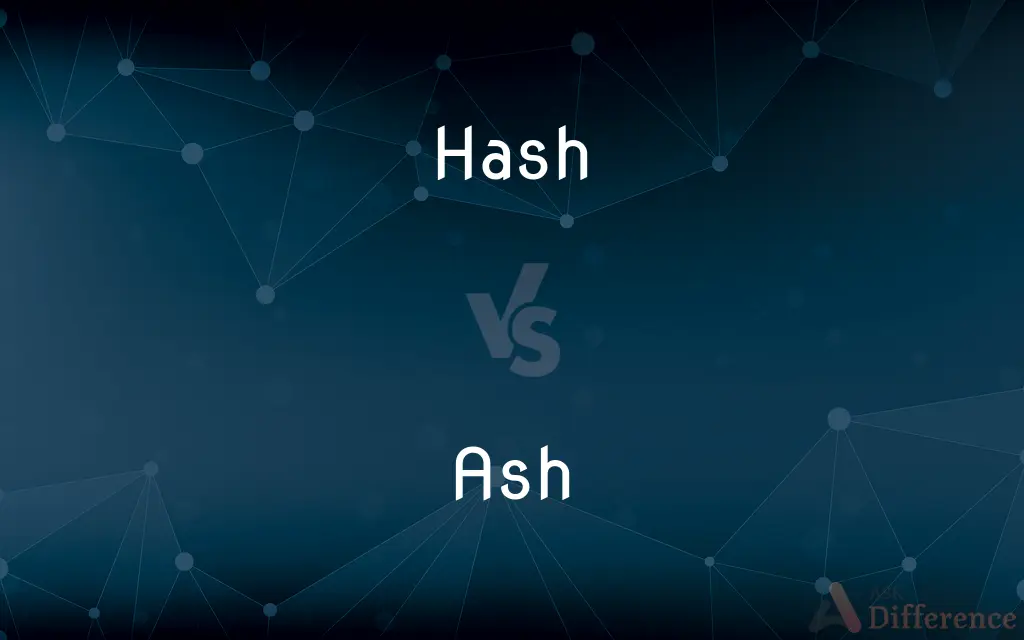Hash vs. Ash — What's the Difference?
By Tayyaba Rehman & Urooj Arif — Updated on March 21, 2024
Hash refers to a culinary dish or a cryptographic function transforming data into a fixed size string, while ash is the powdery residue left after burning.

Difference Between Hash and Ash
Table of Contents
ADVERTISEMENT
Key Differences
Hash, in its culinary context, is a dish made from diced meat and often potatoes, seasoned and cooked together. In contrast, ash results from the combustion of materials, such as wood or coal, leaving a fine, powdery residue that lacks any nutritional or specific utility value in most contexts.
When discussing hash in computing, it refers to a function that converts input data of any size into a fixed-size string, which helps in data retrieval, security, and integrity checks. Whereas ash has no role or comparison in the digital world, highlighting the distinct nature of these two terms across different contexts.
The preparation of hash as a meal involves a process of chopping, mixing, and sometimes frying, indicating a deliberate act of cooking. On the other hand, the formation of ash is a result of a natural process of combustion, requiring heat but no specific culinary skill or intention.
In terms of utility, hash serves as a hearty meal or a way to secure and validate data, showing its versatility. Ash, however, is often considered waste but can be repurposed as fertilizer, in construction, or in art, demonstrating how byproducts can gain secondary uses.
The origin of the term "hash" in cooking is rooted in the French word "hacher," meaning to chop, reflecting its preparation method. Ash derives from Old English "æsce," indicating a long-standing recognition of the substance as a byproduct of fire.
ADVERTISEMENT
Comparison Chart
Definition
A dish of chopped meat and potatoes or a cryptographic function.
The powdery residue left after burning material.
Context
Culinary and computing.
Combustion and residue.
Preparation
Chopping and cooking for the dish; algorithmic for computing.
Result of burning materials.
Utility
Serves as a meal or data security.
Often considered waste but has uses in fertilizers and construction.
Origin of Term
From French "hacher," meaning to chop.
From Old English "æsce."
Compare with Definitions
Hash
To rework or remix existing material.
The writer hashed out the old scripts to fit the new theme.
Ash
A type of tree in the genus Fraxinus.
The ash tree is known for its strong, flexible wood.
Hash
A function converting data into a fixed-size string.
Passwords are stored as hashes for security.
Ash
A pale gray color.
She chose an ash color for the living room walls.
Hash
To discuss thoroughly.
We need to hash over the details of the project.
Ash
The residue after burning wood, coal, or other materials.
We cleaned the fireplace of all the ash.
Hash
A dish made from chopped meat and potatoes.
We had corned beef hash for breakfast.
Ash
In cremation, the remains of a body.
The family kept the ash in an urn.
Hash
Refers to hashish, a drug made from cannabis.
Hash is often smoked in a pipe or bong.
Ash
Symbol of mourning or repentance in some cultures.
Ashes were spread on the forehead on Ash Wednesday.
Hash
A dish of chopped meat, potatoes, and sometimes vegetables, usually browned.
Ash
Ash or ashes are the solid remnants of fires. Specifically, ash refers to all non-aqueous, non-gaseous residues that remain after something burns.
Hash
A jumble; a hodgepodge.
Ash
The powdery residue left after the burning of a substance
I turned over the ashes
Cigarette ash
Hash
(Informal) A mess
Made a hash of the project.
Ash
A trophy for the winner of a series of Test matches in a cricket season between England and Australia.
Hash
A reworking or restatement of already familiar material.
Ash
A tree with compound leaves, winged fruits, and hard pale timber, widely distributed throughout north temperate regions.
Hash
Hashish.
Ash
An Old English runic letter, ᚫ, a vowel intermediate between a and e. It is represented in the Roman alphabet by the symbol æ or Æ.
Hash
The symbol (#); the pound sign.
Ash
The grayish-white to black powdery residue left when something is burned.
Hash
To chop into pieces; mince.
Ash
(Geology) Pulverized particulate matter ejected by volcanic eruption.
Hash
(Informal) To make a mess of; mangle.
Ash
The mineral residue of incinerated organic matter, used as an additive in pet foods.
Hash
(Informal) To discuss carefully; review
Hash over future plans.
Hash out a solution.
Ash
Ashes Ruins
The ashes of a lost culture.
Hash
Food, especially meat and potatoes, chopped and mixed together.
Ash
Ashes Bodily remains, especially after cremation or decay.
Hash
A confused mess.
Ash
Any of various chiefly deciduous trees of the genus Fraxinus, having opposite, pinnately compound leaves, clusters of small flowers, and one-seeded winged fruits.
Hash
(typography) The # symbol (octothorpe, pound).
Ash
The strong, elastic wood of any of these trees, used for furniture, tool handles, and sporting goods such as baseball bats.
Hash
(computing) The result generated by a hash function.
Ash
(Linguistics) The letter æ in Old English and some modern phonetic alphabets, representing the vowel sound of Modern English ash.
Hash
One guess made by a mining computer in the effort of finding the correct answer which releases the next unit of cryptocurrency; see also hashrate.
Ash
To reduce or convert to ash
Ash a tissue sample for analysis.
Hash
A new mixture of old material; a second preparation or exhibition; a rehashing.
Ash
(Informal) To drop ashes from a cigar or cigarette
Accidentally ashed on his own sleeve.
Hash
A hash run.
Ash
The solid remains of a fire.
The audience was more captivated by the growing ash at the end of his cigarette than by his words.
Ash from a fireplace can restore minerals to your garden's soil.
Ashes from the fire floated over the street.
Ash from the fire floated over the street.
Hash
(Scotland) A stupid fellow.
Ash
(chemistry) The nonaqueous remains of a material subjected to any complete oxidation process.
Hash
(informal) Hashish, a drug derived from the cannabis plant.
Ash
Fine particles from a volcano, volcanic ash.
Hash
(transitive) To chop into small pieces, to make into a hash.
Ash
(in the plural) Human (or animal) remains after cremation.
The urn containing his ashes was eventually removed to a closet.
Hash
To make a quick, rough version. en
We need to quickly hash up some plans.
Ash
Mortal remains in general.
Napoleon's ashes are not yet extinguished, and we're breathing in their sparks.
Hash
To transform according to a hash function.
Ash
(figuratively) What remains after a catastrophe.
Hash
To make a mess of (something); to ruin.
Ash
A gray colour, like that of ash.
Hash
That which is hashed or chopped up; meat and vegetables, especially such as have been already cooked, chopped into small pieces and mixed.
Ash
A shade tree of the genus Fraxinus.
The ash trees are dying off due to emerald ash borer.
The woods planted in ash will see a different mix of species.
Hash
A new mixture of old matter; a second preparation or exhibition.
I can not bear elections, and still less the hash of them over again in a first session.
Ash
(uncountable) The wood of this tree.
Hash
Hashish.
Ash
The traditional name for the ae ligature (æ), as used in Old English.
Hash
To chop into small pieces; to mince and mix; as, to hash meat.
Ash
(chemistry) To reduce to a residue of ash. See ashing.
Hash
Chopped meat mixed with potatoes and browned
Ash
(intransitive) To hit the end off of a burning cigar or cigarette.
Hash
Purified resinous extract of the hemp plant; used as a hallucinogen
Ash
(transitive) To hit the end off (a burning cigar or cigarette).
Hash
Chop up;
Hash the potatoes
Ash
To cover newly-sown fields of crops with ashes.
Ash
A genus of trees of the Olive family, having opposite pinnate leaves, many of the species furnishing valuable timber, as the European ash (Fraxinus excelsior) and the white ash (Fraxinus Americana).
Ash
The tough, elastic wood of the ash tree.
Ash
Sing. of Ashes.
Ash
To strew or sprinkle with ashes.
Ash
The residue that remains when something is burned
Ash
Any of various deciduous pinnate-leaved ornamental or timber trees of the genus Fraxinus
Ash
Strong elastic wood of any of various ash trees; used for furniture and tool handles and sporting goods such as baseball bats
Ash
Convert into ashes
Common Curiosities
Can hash have other meanings besides food and computing?
Yes, hash can also refer to hashish, a drug derived from cannabis, among other informal uses.
Is ash useful in gardening?
Yes, ash can be used as a fertilizer due to its mineral content, especially in gardens and for some crops.
What is hash in cooking?
Hash is a dish consisting mainly of chopped meat and potatoes that are seasoned and cooked together.
How is hash valued in cybersecurity?
Hash is crucial in cybersecurity for validating data integrity and securely storing sensitive information like passwords.
What are the primary uses of ash?
Ash is primarily considered waste but can be used as fertilizer, in construction materials, and in some art forms.
What symbolizes ash in cultural contexts?
In some cultures, ash symbolizes mourning, repentance, or renewal, often used in religious and ceremonial practices.
Can ash from different materials have different uses?
Yes, the use of ash can vary depending on its source material, affecting its properties and applications.
How does a cryptographic hash function work?
A cryptographic hash function transforms any size input data into a fixed-size string, ensuring data integrity and security.
Are there environmental concerns with ash disposal?
Yes, improper disposal of ash, especially from industrial processes, can lead to environmental pollution.
Why is ash management important in industrial settings?
Proper ash management is crucial in industrial settings to prevent pollution and repurpose waste for beneficial uses.
What does hashing data mean?
Hashing data means converting the data into a fixed-size string, which helps in quick data retrieval and securing information.
How does the concept of hash differ in computing vs. cooking?
In computing, hash is about data security and integrity, while in cooking, it refers to a specific type of meal preparation.
What is the significance of ash in environmental science?
In environmental science, ash is studied for its effects on soil health, plant growth, and as a component of ecological cycles.
What is hashish?
Hashish, or hash, is a concentrated form of cannabis that is consumed for its psychoactive effects.
How do chefs typically prepare hash?
Chefs prepare hash by chopping ingredients like meat and potatoes, then frying them together with seasonings.
Share Your Discovery

Previous Comparison
Waived vs. Waved
Next Comparison
Hypoactive vs. HyperactiveAuthor Spotlight
Written by
Tayyaba RehmanTayyaba Rehman is a distinguished writer, currently serving as a primary contributor to askdifference.com. As a researcher in semantics and etymology, Tayyaba's passion for the complexity of languages and their distinctions has found a perfect home on the platform. Tayyaba delves into the intricacies of language, distinguishing between commonly confused words and phrases, thereby providing clarity for readers worldwide.
Co-written by
Urooj ArifUrooj is a skilled content writer at Ask Difference, known for her exceptional ability to simplify complex topics into engaging and informative content. With a passion for research and a flair for clear, concise writing, she consistently delivers articles that resonate with our diverse audience.














































